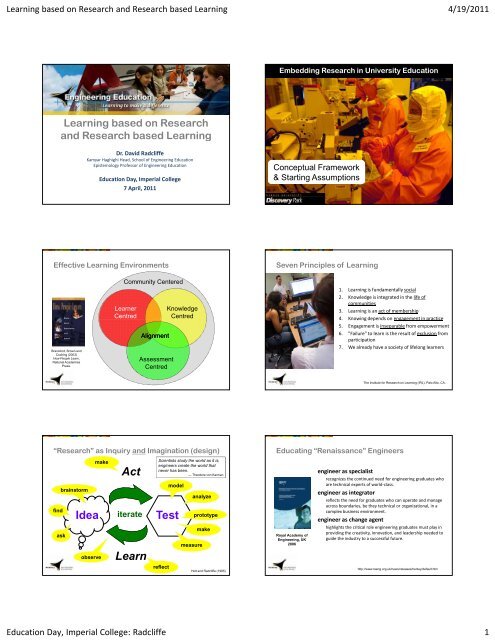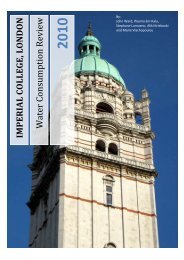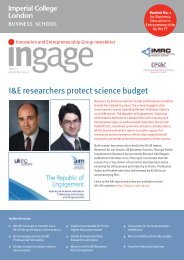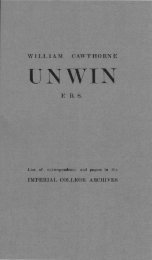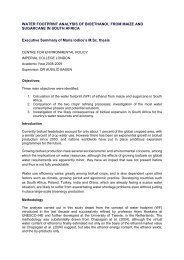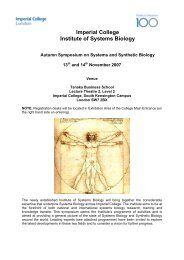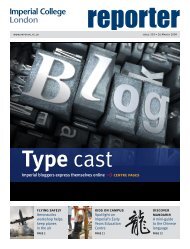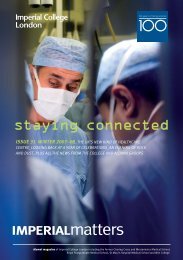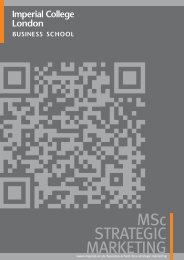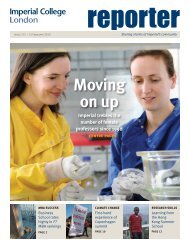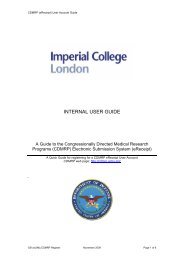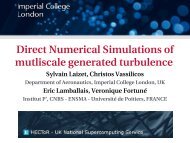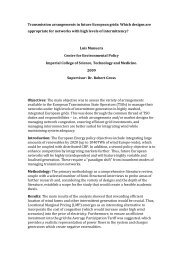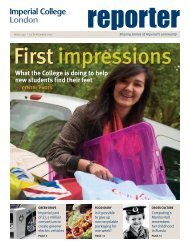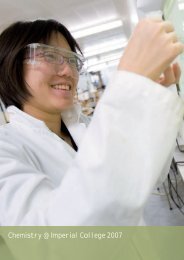Act Idea Test Learn - Imperial College London
Act Idea Test Learn - Imperial College London
Act Idea Test Learn - Imperial College London
Create successful ePaper yourself
Turn your PDF publications into a flip-book with our unique Google optimized e-Paper software.
<strong>Learn</strong>ing based on Research and Research based <strong>Learn</strong>ing 4/19/2011<br />
Embedding Research in University Education<br />
<strong>Learn</strong>ing based on Research<br />
and Research based <strong>Learn</strong>ing<br />
Dr. David Radcliffe<br />
Kamyar Haghighi Head, School of Engineering Education<br />
Epistemology Professor of Engineering Education<br />
Education Day, <strong>Imperial</strong> <strong>College</strong><br />
7 April, 2011<br />
Conceptual Framework<br />
& Starting Assumptions<br />
Effective <strong>Learn</strong>ing Environments<br />
Seven Principles of <strong>Learn</strong>ing<br />
Bransford, Brown and<br />
Cocking (2003)<br />
How People <strong>Learn</strong>,<br />
National Academies<br />
Press.<br />
Community Centered<br />
<strong>Learn</strong>er<br />
Centred<br />
Alignment<br />
Assessment<br />
Centred<br />
Knowledge<br />
Centred<br />
1. <strong>Learn</strong>ing is fundamentally social<br />
2. Knowledge is integrated in the life of<br />
communities<br />
3. <strong>Learn</strong>ing is an act of membership<br />
4. Knowing depends on engagement in practice<br />
5. Engagement is inseparable from empowerment<br />
6. "Failure" to learn is the result of exclusion from<br />
participation<br />
7. We already have a society of lifelong learners<br />
The Institute for Research on <strong>Learn</strong>ing (IRL), Palo Alto, CA.<br />
“Research” as Inquiry and Imagination (design)<br />
find<br />
brainstorm<br />
ask<br />
<strong>Idea</strong><br />
observe<br />
make<br />
<strong>Act</strong><br />
iterate<br />
<strong>Learn</strong><br />
Scientists study the world as it is,<br />
engineers create the world that<br />
never has been.<br />
— Theodore von Karman<br />
model<br />
<strong>Test</strong><br />
reflect<br />
analyze<br />
measure<br />
prototype<br />
make<br />
Holt and Radcliffe (1985)<br />
Educating “Renaissance” Engineers<br />
Royal Academy of<br />
Engineering, UK<br />
2006<br />
• engineer as specialist<br />
– recognizes the continued need for engineering graduates who<br />
are technical experts of world‐class.<br />
• engineer as integrator<br />
– reflects the need for graduates who can operate and manage<br />
across boundaries, be they technical or organizational, in a<br />
complex business environment.<br />
• engineer as change agent<br />
– highlights the critical role engineering graduates must play in<br />
providing the creativity, innovation, and leadership needed to<br />
guide the industry to a successful future.<br />
http://www.raeng.org.uk/news/releases/henley/default.htm<br />
Education Day, <strong>Imperial</strong> <strong>College</strong>: Radcliffe 1
<strong>Learn</strong>ing based on Research and Research based <strong>Learn</strong>ing 4/19/2011<br />
School of Engineering Education at Purdue<br />
Historical Firsts in Engineering @ Purdue<br />
• First Department of Freshman Engineering (1953 ‐2004).<br />
• Interdisciplinary Engineering Program (1969 ‐ onwards).<br />
• First Women in Engineering Program (1969 ‐ onwards).<br />
• NSBE (National Society of Black Engineers) born (1971‐75).<br />
• Co‐founding site of WEPAN (Women in Engineering i Programs<br />
and Advocates Network) (1990 ‐ onwards).<br />
• EPICS (Engineering Projects in Community Service) (1995 ‐ ).<br />
• First Department of Engineering Education (2004).<br />
• School of Engineering Education (2008).<br />
Armstrong Hall<br />
of Engineering<br />
http://www.owenstaylor.com/2010/10/neil-armstrong-hall-of-engineering.html<br />
Evolution of the School of Engineering Education<br />
April 9, 2004 January, 2008<br />
<strong>College</strong> of Engineering Structure at Purdue<br />
11 Schools<br />
Aeronautical and Astronautics<br />
Agricultural and Biological Engineering<br />
1953 Freshman Engineering<br />
1969<br />
IDE Program<br />
Department of<br />
Engineering<br />
Education<br />
PhD in<br />
Engineering<br />
Education<br />
2005<br />
School of<br />
Engineering<br />
Education<br />
<strong>College</strong> of Engineering<br />
Biomedical Engineering<br />
Chemical Engineering<br />
Civil Engineering<br />
Electrical and Computer Engineering<br />
Engineering Education<br />
Industrial Engineering<br />
Materials Engineering<br />
Mechanical Engineering<br />
Nuclear Engineering<br />
2 Divisions<br />
Construction<br />
Engineering<br />
Management<br />
Environmental<br />
and Ecological<br />
Engineering<br />
10,000<br />
engineering<br />
students<br />
Motivation: No More Guess Work<br />
• When it comes to educating our future<br />
engineers, we can no longer afford “an<br />
enterprise of methodical guessing” (Bertrand<br />
Russell).<br />
• Our foremost job is to advance a time-critical<br />
coherent research agenda that integrates a<br />
vital cycle of knowledge production and<br />
improvement of practice.<br />
• Grand questions:<br />
– What are the characteristics of engineering<br />
learning and knowing?<br />
– How can we best prepare engineers for<br />
their role in society?<br />
Vision: School of Engineering Education<br />
A more inclusive, socially connected<br />
and scholarly engineering education<br />
We envision engineers who, in collaboration with others, help communities globally to<br />
achieve their aspirations in creative yet responsible and sustainable ways. Their<br />
education is informed by sophisticated knowledge about how people learn to engineer,<br />
one that attracts and develops a diverse range of people and is suited to addressing<br />
complex socio-technical issues. This implies we radically re-think the boundaries of<br />
engineering and the purpose of engineering education.<br />
Haghighi (2007)<br />
ENE Strategic Plan (2009-14)<br />
Education Day, <strong>Imperial</strong> <strong>College</strong>: Radcliffe 2
<strong>Learn</strong>ing based on Research and Research based <strong>Learn</strong>ing 4/19/2011<br />
Mission: School of Engineering Education<br />
Transforming engineering education<br />
based on scholarship and research<br />
• Re‐imagine Engineering and Engineering Education<br />
– Diversify engineering<br />
– Embed creativity, innovation and social responsibility<br />
– Enrich the student experience<br />
• Create field‐shaping Knowledge<br />
• Empower Agents of Change<br />
ENE Strategic Plan (2009-14)<br />
A Multi-faceted School<br />
Interdisciplinary<br />
Engineering<br />
Degree<br />
Innovative<br />
<strong>Learn</strong>ing<br />
Labs<br />
BS<br />
Engineering<br />
Education<br />
First Year<br />
Engineering<br />
(FYE)<br />
diverse<br />
activities: one<br />
mission<br />
INSPIRE<br />
P‐12<br />
Research<br />
Institute<br />
FYE<br />
Student<br />
Advising<br />
Engineering<br />
Education<br />
Research<br />
Laboratories<br />
PhD in<br />
Engineering<br />
Education<br />
Master of<br />
Engineering<br />
Education<br />
Research Themes in Our School<br />
Knowing our students<br />
Engineering thinking, knowing, and doing<br />
• diversity: race/ethnicity, class, and gender<br />
• engineering epistemologies<br />
• large-scale data analysis<br />
• adaptive expertise in engineering context<br />
• motivation and careers in STEM<br />
• design thinking and engineering decision-making<br />
• P-12 engineering education<br />
• global engineering and international perspectives<br />
• developmental engineering<br />
• mathematical thinking<br />
• recruitment, retention, and student success<br />
• thinking & working in multi-, inter-, & trans-<br />
• self-efficacy and career identity building<br />
disciplinary ways<br />
Transforming engineering education systems<br />
Supporting & assessing learning<br />
• theories of change for engineering education<br />
• conceptual change and concept inventories<br />
• history and nature of engineering<br />
• cyber-learning and cyber-environments<br />
• leadership and policy<br />
• design of learning environments<br />
• evolution of the engineering education research<br />
• instrument design and survey development<br />
community<br />
• learning in out-of-school and informal environments<br />
• faculty and graduate student professional<br />
• models and modeling<br />
development<br />
• service and experiential learning<br />
• teaming and collaborative learning<br />
Million Dollars<br />
Research Funding & <strong>Act</strong>ivity Trends<br />
Awards Expenditures No. of Awards No. Proposals Submitted<br />
12<br />
50<br />
45<br />
10<br />
40<br />
8<br />
35<br />
30<br />
6<br />
25<br />
20<br />
4<br />
15<br />
2<br />
10<br />
5<br />
0<br />
0<br />
2003‐04 2004‐05 2005‐06 2006‐07 2007‐08 2008‐09 2009‐10<br />
PhD Program in Engineering Education<br />
20 PhD<br />
Graduates<br />
Prospective Career Trajectories of Our PhDs<br />
Policy<br />
NGOs<br />
Professional societies<br />
<strong>Learn</strong>ing to make a difference<br />
Industry<br />
ENE Graduate Open House: Picture Alice Pawley<br />
50 Current<br />
PhD Students<br />
P-12 & Community<br />
Universities<br />
Education Day, <strong>Imperial</strong> <strong>College</strong>: Radcliffe 3
<strong>Learn</strong>ing based on Research and Research based <strong>Learn</strong>ing 4/19/2011<br />
<strong>Learn</strong>ing based on Research<br />
The Virtuous Cycle of Research & Practice<br />
which help<br />
improve<br />
Innovative<br />
Educational<br />
Practice<br />
identifies and<br />
motivates<br />
Answers<br />
Insights<br />
Questions<br />
<strong>Idea</strong>s<br />
ASEE, 2009<br />
that results in<br />
Original<br />
Educational<br />
Research<br />
which lead to<br />
Scientific Principles of Research in Education<br />
Breadth of Engineering Education Research<br />
National<br />
Research Council<br />
(2002)<br />
1. Pose significant questions that can be answered<br />
empirically<br />
2. Link research to relevant theory<br />
3. Use methods that permit direct investigation of<br />
the question<br />
4. Provide a coherent and explicit chain of reasoning<br />
5. Replicate and generalize across studies<br />
6. Disclose research to encourage professional<br />
scrutiny and critique<br />
Pre-K K-12 <strong>College</strong> Industry<br />
understanding knowledge construction & sharing<br />
and community membership processes<br />
in engineering contexts<br />
across all life and career stages<br />
in<br />
formal and informal learning environments<br />
Purdue Engineer of 2020:<br />
<strong>Idea</strong>s-to-Innovation (i2i) <strong>Learn</strong>ing Laboratory<br />
a 21 st century place of learning<br />
“We shape our buildings….<br />
after that our buildings shape us”<br />
innovation based on<br />
engineering education research<br />
Sir Winston Churchill<br />
Education Day, <strong>Imperial</strong> <strong>College</strong>: Radcliffe 4
<strong>Learn</strong>ing based on Research and Research based <strong>Learn</strong>ing 4/19/2011<br />
<strong>Act</strong>ive, Collaborative, <strong>Learn</strong>er-centered Classes<br />
Creating “Exciting Venues for <strong>Learn</strong>ing”<br />
<strong>Learn</strong>ing to make a difference<br />
“A goal is to abandon over time the large classes in<br />
which students sit passively in favor of smaller classes<br />
that engage students in experiential learning. We<br />
hope to transform some or all of our gateway classes<br />
that currently seat hundreds of students -- and<br />
ultimately defeat large numbers of them -- into exciting<br />
venues for learning.<br />
A role model is our <strong>College</strong> of Engineering that<br />
is transforming its classrooms with 450 freshman<br />
students into a five-module, hands-on design<br />
experience called <strong>Idea</strong>s to Innovation”.<br />
25<br />
President Cordova, Inaugural Speech, April 11, 2008<br />
Institute for P-12 Engineering <strong>Learn</strong>ing and Research<br />
P-12 Engineering: Context<br />
• Mission: To study engineering thought and learning at the P‐12<br />
level and to inspire diverse students to pursue engineering and<br />
science for the benefit of humanity and the advancement of<br />
society.<br />
• Research: Basic and applied multidisciplinary research focusing on–<br />
teacher professional development, assessment, student learning,<br />
and informal learning.<br />
• People:<br />
– 9 academic staff<br />
– 5 postdoctoral fellows<br />
– 13 graduate (PhD) students<br />
– 15 undergraduate researchers<br />
– 3 support staff<br />
Katehi, Pearson,<br />
and Feder (Ed)<br />
(2009) NAE/NRC<br />
Engineering is Elementary:<br />
Museum of Science, Boston<br />
Threshold Concept: Design<br />
Changing gthe<br />
Conversation<br />
(2008) National<br />
Academy of<br />
Engineering<br />
Building Teaching Capacity based on Evidence<br />
• Concept based curriculum; centred on design<br />
• Engineering as integrative element<br />
• Informal learning about engineering in families<br />
• Engineering identity interventions (Yr 2‐4)<br />
• Engineering Teacher‐in‐Residence program (K‐5): unique onlocation,<br />
in‐time teacher professional development model<br />
• AssessmentHub: online repository for P‐12 research and<br />
evaluation instruments<br />
• New Journal: Journal of Pre‐<strong>College</strong> Engineering Education<br />
Research (J‐PEER) –first issue April 2011<br />
• Impacted 600+ teachers and > 17,000 Grade 2‐4 students<br />
Research-based <strong>Learn</strong>ing<br />
http://news.uns.purdue.edu/images/+2006/vomit-collicot.jpg<br />
Education Day, <strong>Imperial</strong> <strong>College</strong>: Radcliffe 5
<strong>Learn</strong>ing based on Research and Research based <strong>Learn</strong>ing 4/19/2011<br />
Undergraduate Research Programs at Purdue<br />
Multi-subject / Multi-disciplinary<br />
CIC Summer Research Opportunities<br />
Discovery Park Undergraduate Research Internship Program (AY)<br />
Interns for Indiana (Entrepreneurial; semester credit or summer)<br />
Purdue Summer Research Opportunities Program<br />
Summer Bridge Program<br />
Summer Undergraduate Research Program (SURF)<br />
Biomedical Engineering (credit)<br />
Joint Transport Research Program (summer)<br />
Life Sciences, Agriculture and Medicine Program (semester)<br />
Entomology Undergraduate Research Program (semester; credit)<br />
Horticulture and Landscape Architecture Internships (summer)<br />
Pharmacy and Pharmaceutical Sciences Dean’s Summer Program<br />
Purdue University Center for Cancer Research (summer)<br />
Summer Program for Pre‐veterinary Students<br />
Science, Mathematics, Computer and Technology Programs (summer)<br />
Summer Undergraduate Research Fellowship (SURF)<br />
• Integrated, research‐related, hands‐on learning through discovery<br />
• Conduct mentored research full time for 11 weeks over summer<br />
• Participate in weekly professional development activities and social events<br />
• Present results in poster symposium and get assessment feedback<br />
SURF Statistics<br />
Started 2003<br />
Number grew to 162 by 2005<br />
Cumulative 997 by 2010<br />
(828 Purdue; 169 other)<br />
Women up to 25%<br />
Minorities up to 20%<br />
Eligibility<br />
• Undergraduate students enrolled at Purdue and other U.S. institutions of<br />
higher education in a baccalaureate degree program.<br />
• Due to the requirements of the research projects, the SURF program is<br />
designed for undergraduates who have completed at least four semesters<br />
• Cumulative GPA of 3.0+ (out of 4)<br />
• 18 years old.<br />
Apply to grad Purdue school ‐ 48%<br />
Admitted to Purdue – 40%<br />
Accept (enroll) at Purdue – 29%<br />
Expectations of Students<br />
• Take a proactive approach to your work and to develop your research skills.<br />
• Forge good relationships with your research mentors and peers.<br />
• Be on time to scheduled events and actively participate as needed.<br />
• Participate in the SURF 2011 program assessment.<br />
• Communicate to any changes to your participation status.<br />
• Seek assistance and ask questions to meet your educational & personal goals.<br />
• Take advantage of ALL resources available to you (people and facilities).<br />
Requirements<br />
Commit to the research project<br />
Organize a weekly meeting with faculty mentor<br />
Conduct research 40 hours a week<br />
Attend the SURF orientation & seminar series<br />
Plan ahead<br />
Complete assignments on time<br />
Complete online modules on research<br />
Complete Responsible Conduct of Research<br />
Write a problem statement & research abstract<br />
Write a research summary or lab report<br />
Present findings at Research Symposium<br />
Education Day, <strong>Imperial</strong> <strong>College</strong>: Radcliffe 6
<strong>Learn</strong>ing based on Research and Research based <strong>Learn</strong>ing 4/19/2011<br />
Engineering Projects<br />
in Community Service<br />
Pedagogical Principles<br />
Service <strong>Learn</strong>ing<br />
Multi‐level learning<br />
Experiential learning<br />
<strong>Act</strong>ive learning<br />
Problem‐based learning<br />
Inquiry‐guided id d learning<br />
Design based education<br />
Engaging the community<br />
Tied to academic learning outcomes<br />
Reciprocity<br />
Reflection<br />
https://engineering.purdue.edu/EPICS/About/ovpresentation.pdf<br />
Multi-disciplinary, Life Cycle Projects<br />
Example Projects<br />
• Life‐Cycle: Define‐Design‐Build‐<strong>Test</strong>‐Deploy‐Support<br />
• Long‐term partnerships with community organizations<br />
• Vertically‐integrated teams:<br />
– First year +Sophomores+ Juniors+ Seniors<br />
• Large‐team experience: 8‐18 students<br />
• Multidisciplinary teams:<br />
– Engineering (ECE; ME, IE; IDE)<br />
– Computer Science<br />
– Sociology, Education,<br />
– Child Development<br />
– Biology, Audiology,<br />
– Natural Resources<br />
– Visual Design, Technical Writing<br />
Habitat for Humanity<br />
Boiler Green Initiative<br />
Columbian Park Zoo<br />
Community and Family<br />
Resource Center<br />
Electric Vehicle Event<br />
Infrastructure<br />
Engineering gfor World Health<br />
Greater Lafayette Area Special<br />
Services<br />
Greater Lafayette Elementary<br />
Education<br />
Habitat for Humanity<br />
Haiti Education<br />
Imagination Station<br />
Laser Harp<br />
<strong>Learn</strong>ing Science and Math<br />
through Engineering<br />
Riley Children’s Hospital<br />
Advancement Team<br />
Soap Box Derby, Challenger<br />
Division<br />
Speech‐Language and Audiology<br />
Clinics<br />
St. Vincent Advancement Team<br />
Water Resources Management<br />
Web‐based Interactive Software<br />
Engineering<br />
West Lafayette Public Library<br />
Young Women's Christian<br />
Association<br />
https://engineering.purdue.edu/EPICS/About/ovpresentation.pdf<br />
https://engineering.purdue.edu/EPICS/Projects/Teams<br />
Impact on Students<br />
“EPICS completely changed my opinion of engineering.”<br />
“Working on this project has helped me guide the rest of my course work and<br />
ideas for a future profession.”<br />
“Other engineering courses only directly benefit me. EPICS benefits everyone<br />
involved.”<br />
“I have learned that engineering includes more than theory, it includes<br />
teamwork, communication, organization and leadership.”<br />
“It made me understand how every aspect of engineering (design,<br />
implementation, team work, documentation) come together.”<br />
“No longer is engineering just a bunch of equations, now I see it as a means to<br />
help humankind.”<br />
“Opened my heart.”<br />
National Recognition<br />
William C. Oakes, Leah Jamieson and Edward J. Coyle<br />
Bernard M. Gordon Prize<br />
for Innovation in<br />
Engineering and<br />
Technology Education<br />
National Academy of<br />
Engineering<br />
2005<br />
https://engineering.purdue.edu/EPICS/About/ovpresentation.pdf<br />
Education Day, <strong>Imperial</strong> <strong>College</strong>: Radcliffe 7
<strong>Learn</strong>ing based on Research and Research based <strong>Learn</strong>ing 4/19/2011<br />
Louis Stokes Alliance for Minority Participation<br />
Concluding Thoughts<br />
To substantially increase the<br />
quantity and quality of students,<br />
especially minorities, in Science,<br />
Technology, Engineering and<br />
Mathematics (STEM).<br />
Undergraduate Funding Opportunities<br />
– Academic year research stipend<br />
– Summer research stipend<br />
– Conference Travel Awards<br />
– Purdue Graduate School Expo Fair<br />
Faculty Funding Opportunities<br />
– Research supplies stipend<br />
– Summer research supplies stipend<br />
– LSAMP Annual Research Conference<br />
Rethinking the Formation of Engineers<br />
Global Challenges: Educational Opportunities<br />
Acquiring (de-contextualized)<br />
engineering and other<br />
knowledge and skills<br />
OR<br />
Knowing, acting,<br />
being an (apprentice)<br />
engineer<br />
Resource Depletion<br />
Ecological Damage<br />
Climate Change<br />
If the purpose of education is<br />
that of learning to learn,<br />
learning to know, learning to<br />
do and, above all else,<br />
learning to be, it is hard to find<br />
where the lecture fits into this<br />
scheme of things.<br />
[Sir Graham Hills; see also D.A.Bligh, 1972]<br />
Dec 7, 1972<br />
Water<br />
Food<br />
Shelter<br />
Energy<br />
Transport<br />
Sustainable Futures<br />
46<br />
Thank You<br />
Dedication of Armstrong Hall, Oct, 2007<br />
Education Day, <strong>Imperial</strong> <strong>College</strong>: Radcliffe 8


